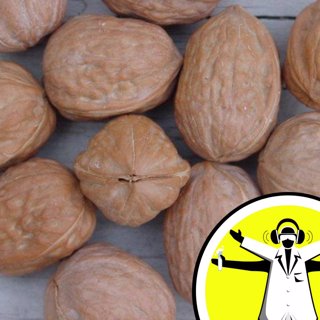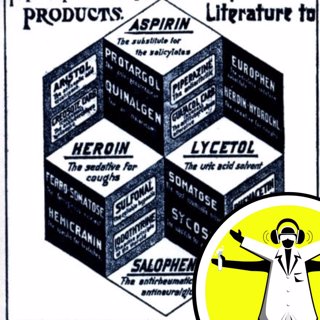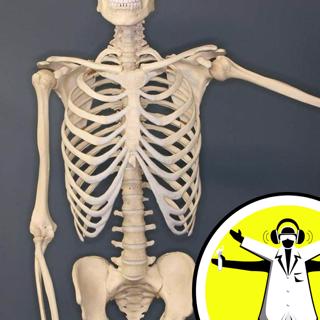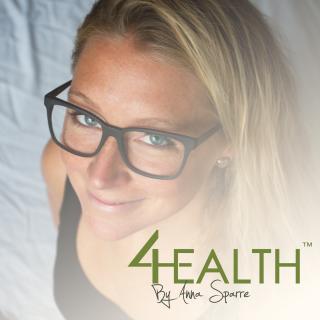
Why did a Laser Make My Nuts Glow?
Can you electrocute weeds? Why do teeth go wobbly? And which cells last a lifetime? In this bumper edition of the Naked Scientists, we tackle your pressing science questions and find out how the shuttle manoeuvres in space, what makes wounds itch, whether reverse osmosis can make moonshine and if static can stick a cat to a wall. Plus, how diamonds deal death to tumours, cooperation in the elephant world and an update on the Japanese earthquake situation. We also hear how a hairy leg can help you bend water to your will, and Diana discovers why potato peelers never need sharpening! Like this podcast? Please help us by supporting the Naked Scientists
13 Mars 20111h 2min

Aspirin's Anniversary
From anti-ague to anti-Alzheimer's agent: over the 112 years since it was first trademarked, Aspirin has evolved from popular painkiller to powerful preventative against heart attacks, strokes and even cancer. In this week's show we trace its history from the extraction of aspirin-like chemicals from willow bark to the creation of the drug itself. Plus, in the news, how the chemistry of life could have come to Earth in a meteorite and why we need to be careful with stem cells: a new study finds they have an above-average mutation rate. Also, a new technique to etch graphene sheets with... Like this podcast? Please help us by supporting the Naked Scientists
6 Mars 201155min

Boosting Your Bones
Just the bare bones this week as we find out how exercise strengthens the skeleton and how new scanning techniques can help to pick up osteoporosis earlier and inform its management. We also try out a new gadget for measuring the force muscles can apply and, in the news, discover what a self-healing tumour can tell us about common cancers, evidence that mammalian hearts can repair themselves and a new laser-based tool for diagnosing melanoma. Plus, how the bones of people who died up to a hundred years ago are helping scientists to combat chronic back pain by building a computer model of the... Like this podcast? Please help us by supporting the Naked Scientists
27 Feb 201158min

Checking the Atmosphere and Changing the Climate
We look to the skies in this week's Naked Scientists show, to uncover ways to monitor and change the chemistry of the atmosphere. We join researchers on board an air-sampling aeroplane to discover how atmospheric chemistry changes once the sun sets, and we discuss options for engineering the climate if things get too hot. In the news, the Ecuadorian population that may hold the genetic key to a disease-free life, and the rocks that move themselves around in Death Valley. Plus, a targeted muscle re-innervation strategy to afford amputees more powerful prosthetic control. Like this podcast? Please help us by supporting the Naked Scientists
20 Feb 201157min

What Makes Mucus Green?
How do magnets multiply? What keeps an aeroplane in the air? How do wild animals avoid incest? It's open season on science questions in this week's Naked Scientists. We'll find out if oil extraction leaves a cavity, can cranberry juice cut urine infection rates and what happens when two lightning bolts collide? In the news, evidence of bipedalism in an early human ancestor, how oily fish helps avoid common causes of blindness and how smartphones are taking the pain out of cardiac rehabilitation. Plus, in Kitchen Science, the unexpected physics of a flying balloon. Like this podcast? Please help us by supporting the Naked Scientists
13 Feb 20111h 7min

Low Energy, High-Power Processing
This week we're getting inside the workings of the next generation of chips that are set to pack a bigger computing-punch but at a fraction of the energy-expenditure of todays' models: CTO Mike Muller joins us to explain the revolutionary technology that leading microprocessor-maker ARM is developing. Also, energy-efficient world-wide computing - we find out how distributing data-processing demands around the planet can turn waste energy into useful computations, simultaneously saving CO2 emissions, and in the news this week, a new malarial mosquito threat, rejection-free artificial blood... Like this podcast? Please help us by supporting the Naked Scientists
6 Feb 201156min

Leprosy: The Low Down
Leprosy goes under the microscope this week as we uncover the origins of one of the oldest known human diseases, recognised this week on World Leprosy Day. A quarter of a million new cases are diagnosed every year, but how is the illness spreading, what damage does it do to the body and can it be stopped? We also hear what archaeologists are unearthing about the history of leprosy and where it came from in the first place. Plus, why it's time to rethink the workings of the circadian clock, brain scans for bilingualism, cow-stomach bacterial genes for biofuels, and the engineering that lies... Like this podcast? Please help us by supporting the Naked Scientists
30 Jan 201154min

Analysing Antimatter
We're analysing the matter of antimatter this week to find out what is antimatter, how is it made and why's it so rare in the Universe? We talk to researchers at CERN who are capturing anti-hydrogen so scientists can study it properly for the first time, and Dave and Meera call in to the hospital to hear how antimatter holds the key to better body scans. Diana discovers how gravity bends a beam of light and there's also news of a novel way to neutralise HIV, researchers uncover how brains gauge the passage of time, and agriculture on the microscale: scientists have found the world's smallest... Like this podcast? Please help us by supporting the Naked Scientists
23 Jan 201155min





















